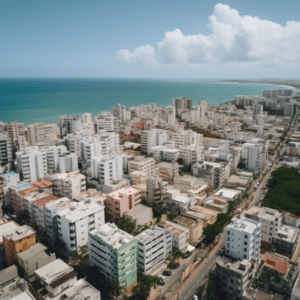Puerto Rico trust funds have been gaining popularity as a powerful tool for estate planning and asset protection.
As more individuals and families look for ways to secure their financial future, it’s becoming increasingly important to understand the benefits and details of setting up a Puerto Rico trust.
The purpose of this blog is to provide comprehensive and expert information on the topic, including the steps to setting up a Puerto Rico trust bank account, the different types of Puerto Rico trusts, and the advantages of using this powerful tool.
If you want to invest as an expat or high-net-worth individual, which is what I specialize in, you can email me (advice@adamfayed.com) or use WhatsApp (+44-7393-450-837).
What is a Puerto Rico trust fund?
A Puerto Rico trust fund is a type of trust that is established under Puerto Rican law. A trust is a legal arrangement in which one or more individuals (the grantors) transfer assets to a trustee for the benefit of specified beneficiaries.
In the case of a Puerto Rico trust fund, the assets are held and managed by the trustee in accordance with the terms of the trust agreement and Puerto Rican law.
Individuals may choose to set up a Puerto Rico trust fund for a variety of reasons, including estate planning, asset protection, and tax savings.
Estate planning with a Puerto Rico trust can help ensure that assets are transferred to future generations in an orderly and efficient manner, while also minimizing the impact of estate taxes.
Asset protection is another important factor, as a Puerto Rico trust can provide a layer of protection against creditors and other potential threats to an individual’s wealth.
Finally, Puerto Rico’s favorable tax laws and regulations can provide significant tax savings for individuals and families, making a Puerto Rico trust fund a valuable tool for maximizing wealth and preserving financial security.
What are the steps in setting up a Puerto Rico trust fund?
The process of setting up a Puerto Rico trust fund can be complex, and it’s recommended that you seek the advice of a professional, such as a financial advisor or attorney, to ensure that the trust is set up correctly and in accordance with Puerto Rican law.
However, in general, setting up a Puerto Rico trust fund entails the following processes:
Choose a Trustee
The first step in setting up a Puerto Rico trust fund is to choose a trustee. This can be an individual or a corporate trustee, and it’s important to select someone you trust who has the necessary experience and expertise to manage the trust.
Draft the Trust Agreement
The next step is to draft the trust agreement, which outlines the terms and conditions of the trust, including the purpose of the trust, the assets that will be transferred, and the rights and responsibilities of the trustee and beneficiaries.
Transfer Assets to the Trust
Once the trust agreement has been drafted, the next step is to transfer assets into the trust. This can include cash, securities, real estate, and other assets.
Obtain a Tax ID Number
In order to set up a bank account for the trust, you will need to obtain a tax identification number (TIN) for the trust. This can be done by submitting an application to the Puerto Rican tax authorities.
Open a Bank Account
The final step is to open a bank account for the trust. This can be done with the assistance of a financial advisor or an attorney familiar with Puerto Rican trusts.
Once the bank account has been established, the trustee can begin managing the assets and carrying out the terms of the trust agreement.

The final step in setting up a trust fund in Puerto Rico is to open a bank account for the trust.
What are the different types of Puerto Rico trust funds?
There are several different types of Puerto Rico trust funds, each with its own unique features and benefits. Some of the most common types include:
Irrevocable Trust
An irrevocable trust is a type of trust that cannot be amended or revoked once it has been established. This type of trust is often used for estate planning and asset protection purposes.
Revocable Trust
A revocable trust, also known as a living trust, is a type of trust that can be amended or revoked during the grantor’s lifetime. This type of trust is often used to manage assets and provide for the grantor’s needs during their lifetime and then distribute assets to beneficiaries after their death.
Charitable Trust
A charitable trust is a type of trust that is established for the purpose of supporting charitable organizations or causes. This type of trust can provide tax benefits for the grantor, as well as support for the chosen charity.
Generation-Skipping Trust
A generation-skipping trust is a type of trust that is designed to skip over one or more generations of beneficiaries and provide assets directly to future generations. This type of trust can help minimize the impact of estate taxes and provide for future generations.
Special Needs Trust
A special needs trust is a type of trust that is established for the benefit of an individual with a disability. This type of trust can help provide for the individual’s needs without affecting their eligibility for government benefits.
What documents are required to open a Puerto Rico trust fund?
The specific documents required to open a Puerto Rico trust fund will vary depending on the type of trust and the individual’s specific needs. However, some of the common documents that may be required include:
Trust Agreement
The trust agreement is the document that outlines the terms and conditions of the trust, including the purpose of the trust, the assets that will be transferred, and the rights and responsibilities of the trustee and beneficiaries.
Tax ID Number
In order to open a bank account for the trust, you will need to obtain a tax identification number (TIN) for the trust. This can be done by submitting an application to the Puerto Rican tax authorities.
Bank Account Application
To open a bank account for the trust, you will need to complete a bank account application and provide the necessary identification and documentation.
Proof of Ownership of Assets
You will also need to provide proof of ownership of the assets that will be transferred into the trust. This may include certificates of ownership for securities, deeds for real estate, or other documentation as required by the bank.
Power of Attorney
If you are granting someone the authority to act on your behalf with respect to the trust, you may need to provide a power of attorney document.

If you are granting someone the authority to act on your behalf with respect to the trust, you may need to provide a power of attorney document.
Can non-residents of Puerto Rico set up a trust in the country?
Yes, non-residents of Puerto Rico can set up a trust in the country. Puerto Rico’s favorable tax laws and regulations, as well as its strong legal framework, make it an attractive destination for individuals and families looking to establish trust.
However, it’s important to note that there are certain requirements that must be met in order to establish a trust in Puerto Rico, including the selection of a qualified trustee and the preparation of a trust agreement that complies with Puerto Rican law.
Additionally, non-residents may need to take additional steps to comply with tax laws in their home country.
It’s recommended that non-residents seeking to establish a Puerto Rico trust work with a financial advisor or attorney who is familiar with the process and can help ensure that the trust is set up correctly and in compliance with all applicable laws and regulations.
What are the benefits of having a Puerto Rico trust fund?
There are several benefits to having a Puerto Rico trust fund, including:
Estate Planning
A Puerto Rico trust fund can be an effective tool for estate planning, as it can help ensure that assets are transferred to future generations in an orderly and efficient manner while also minimizing the impact of estate taxes.
Asset Protection
A Puerto Rico trust fund can provide a layer of protection against creditors and other potential threats to an individual’s wealth. By transferring assets into the trust, individuals can protect their assets from creditors, lawsuits, and other risks.
Tax Savings
Puerto Rico’s favorable tax laws and regulations can provide significant tax savings for individuals and families. For example, Puerto Rico does not impose a federal estate tax or a gift tax, which can provide significant savings compared to other jurisdictions.
Confidentiality
Trusts can provide a high degree of confidentiality, as the terms of the trust agreement and the identity of the beneficiaries may not be disclosed to the public.
Professional Management
By selecting a qualified trustee, individuals can ensure that their assets are managed professionally and in accordance with their wishes. This can provide peace of mind and help ensure the long-term success of the trust.
What are the tax implications of setting up a Puerto Rico trust fund?
The tax implications of setting up a Puerto Rico trust fund will depend on the individual’s specific circumstances, including their tax residency and the type of trust that is established. However, some of the general tax benefits of a Puerto Rico trust fund include:
No Federal Estate Tax
Puerto Rico does not impose a federal estate tax, which can provide significant savings compared to other jurisdictions.
No Gift Tax
Puerto Rico does not impose a gift tax, which means that individuals can transfer assets into the trust without incurring any gift tax liability.
Favorable Income Tax Rates
Puerto Rico has favorable income tax rates, with a maximum marginal tax rate of 33% for individuals and corporations. This can provide significant tax savings for individuals and businesses that have significant income.
Estate Tax Credit
Puerto Rico provides an estate tax credit for individuals who died while residing in the country, which can reduce the overall tax liability for the estate.

It’s recommended that non-residents seeking to establish a Puerto Rico trust work with a financial advisor or attorney who is familiar with the process.
Can I still access my funds in a Puerto Rico trust if I leave the country?
Whether you can access your funds in a Puerto Rico trust if you leave the country will depend on the terms of the trust agreement and the role you have in the trust.
In general, the trustee has the responsibility for managing the assets in the trust and making distributions to the beneficiaries, so access to the funds may be limited.
However, if you are the grantor of the trust (the individual who transferred assets into the trust), you may have some level of control over the trust assets and may be able to access the funds through the trustee.
Additionally, if you are a beneficiary of the trust, you may be entitled to receive distributions from the trust according to the terms of the trust agreement.
It’s important to note that the specific terms and conditions of a Puerto Rico trust will vary depending on the type of trust and the individual’s specific needs, so it’s recommended that you seek the advice of a professional, such as a financial advisor or attorney, to determine your rights and responsibilities with respect to the trust.
Are there any restrictions on how I can use the funds in my Puerto Rico trust?
The restrictions on how you can use the funds in your Puerto Rico trust will depend on the terms of the trust agreement and Puerto Rican law.
In general, the trust agreement will outline the purpose of the trust and the specific rights and responsibilities of the trustee and beneficiaries with respect to the trust assets.
For example, the trust agreement may specify that the trust assets can only be used for certain purposes, such as education expenses, medical expenses, or other specific needs of the beneficiaries. The trust agreement may also set limits on the amount and timing of distributions from the trust.
Additionally, Puerto Rican law imposes certain restrictions on the use of trust assets, such as the requirement that the assets be used for the benefit of the beneficiaries and in accordance with the terms of the trust agreement.
Conclusion
In conclusion, a Puerto Rico trust fund can be a valuable tool for individuals and families looking to secure their financial future.
The decision to set up a Puerto Rico trust fund is a personal one and should be based on a thorough understanding of the benefits and limitations of this type of trust.
In the end, a Puerto Rico trust fund can be a powerful tool for securing your financial future with the right planning and professional guidance.
Pained by financial indecision?

Adam is an internationally recognised author on financial matters with over 830million answer views on Quora, a widely sold book on Amazon, and a contributor on Forbes.




I want to set up a revocable trust for a house i own in puerto rico but dont know were to start i live in FL
If establishing a trust and ultimately residing in pr under act 60 I think it’s called, no federal gift tax and no federal estate tax. Does this mean that on death, the max death tax exemption being $6 million in 2025 is unlimited in pr and distributions made to USA beneficiaries tax free? Are there any no contest clause provisions or right to know? If a grantor has an act 60 corporation and personal can those be used to hold corps from which the trust may get those assets upon death she pay the 4% rate? What are the capital gains taxes and tax on income like dividends & interest? Can a dynasty trust be established not a generation skipping? Is the trust rewritten in Spanish? Are the teens of the trust public record? Or just the existence of filed as a pr trust? I see a number of complaints about the new law from 2018 but I don’t know what the fuss is over. Pr laws seem to change often which is concerning
Hi Chris can you email me your exact questions please – advice@adamfayed.com.